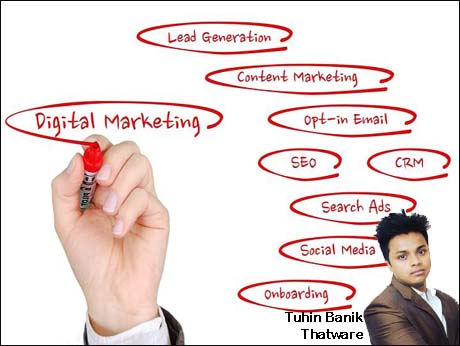
By Tuhin Banik, Founder ThatwareLLP
September 20 2019: With chatbots and self-serving kiosks popping up all over the place, employees in certain sectors are already beginning to wonder whether this increasing onslaught of Artificial Intelligence will eat up their jobs. With digital devices and platforms becoming an increasingly common part of everyday life, businesses and brands have started to leverage digital technologies on the internet for their marketing efforts. Intelligent machines are also developing rapidly, and their increasing sophistication at predicting customer behavior is set to pose a challenge for traditional marketers. If you are a digital marketer, it is natural for you to wonder as to how automation is going to affect the future of your career. It is an undeniable fact that Artificial Intelligence is taking over almost every facet of the digital experience and it will continue to bring about significant differences in the way services are delivered.
Automated services for outreach are becoming more common by the day with AI-based intelligent assistants like Siri that rely entirely on voice recognition. A central part of the debate remains as to whether computers really stole jobs or just changed their nature, allowing employees to shift to more engaging endeavors, leaving the monotonous work to the machines. For marketers too, there have been a number of shifts towards partial automation. However, these shifts haven’t caused extensive job losses in their wake.
How Artificial Intelligence Will Change the Nature of Marketing Jobs
Machine learning and AI are two of the most commonly used technologies in marketing today. Marketers leverage them to gain a better understanding of their audiences, streamline the production of content, personalize their offerings, research better, collate and analyze large amounts of data, and apply the insights derived from them into making better business decisions.
As is the case with any other technological change, AI has just created the demand for new skillset instead of rendering traditional roles completely redundant. You will still need people to write code for conversation programs and monitor the conversations with chatbots. Most importantly, you will still need people who can parse and understand large amounts of data and communicate the insights derived from them to the people who are in charge of planning business strategies. Predictive analysis will end up taking over math related jobs, but the applications will still need people to guide and interpret them.
According to a recent survey by Salesforce where 3500 digital marketers were interviewed, half of them were already using Ai in some form or the other and the number is only expected to go up this year. AI is very useful for predictive analysis techniques like lead scoring which can save both marketing and sale teams a lot of time, allowing them to target audiences more efficiently.
Which jobs are at stake?
|There is no denying that robots, like e-commerce, have started to take over many aspects of retail
Content generation – AI is slowly taking over content curation and creation jobs. AI based natural language processing programs, such as Wordsmith, are already capable of generating automated content.
Communication – AI is being extensively deployed to manage and direct email campaigns, and personalize them with the help of data derived from contacts. There are a number of automated email programs in the market and a substantial number of them use AI to direct the customers towards the product/ service they want.
Automated ads – Automated ads are becoming the norm as companies like Google and Facebook are increasingly turning to AI for collecting and analyzing data, and using the insights for targeted marketing.
What should be your approach?
If you resist the increasing ubiquity of automation and refuse to learn how to use it, then your job is definitely at stake. But if you are willing to adapt and train yourself, then you can effectively leverage AI to stay ahead of your competition.
- Create the required workforce: – A rise in automation has made it harder for companies to hire people with digital marketing expertise as they simply don’t receive formal education at universities. According to the analytics firm Burning Glass, almost half of the openings for marketing jobs require digital skills, and they also take longer to fill. Educational institutions should take the lead and include graduate courses that help students stay abreast of the latest market developments. They should also forge links with the industry to ensure that an upgraded workforce is available.
- Upskilling – On this front, digital marketers are already in lockstep with the technological developments in marketing. They need to re align their strategies to stay ahead of the trends. The bright side is that most digital marketers are versatile, and have a broad skillset. This means that they should not face any trouble pivoting if one of the skills becomes automated. However, they should also strive to keep themselves updated on the latest developments in the industry if they want to stay relevant in the long run.
Marketers need to be proactive and stay updated on the latest trends to deliver the best possible experience to their customers, multitask, and generate the best possible leads, no matter what their background or specialty is. Staying on top of the changing trends will not only impress your customers but also the people you work with. So, irrespective of whether or not automation will completely take over digital marketing, marketers need to make training themselves a priority.
Thatware LLP, is the world’s first comprehensive AI based digital marketing company founded with the aim of revolutionizing the face of digital marketing with the help of Artificial Intelligence, Machine Learning, and Data Science.